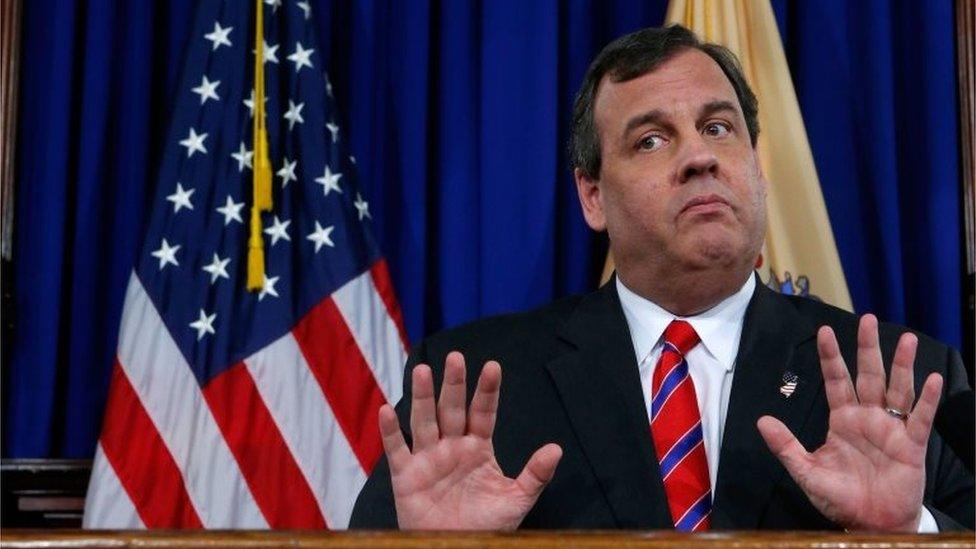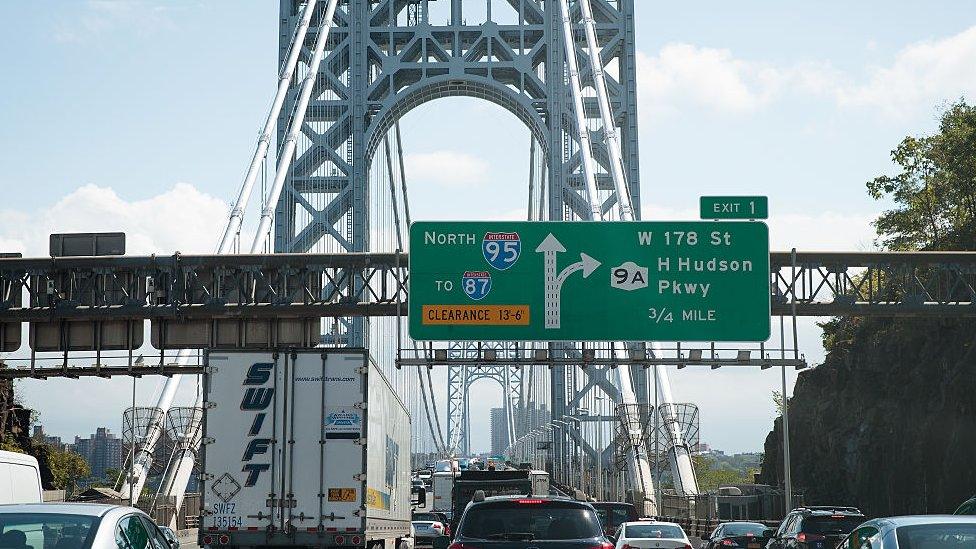New Jersey Governor Chris Christie 'laughed about Bridgegate'
- Published

Mr Christie has repeatedly denied knowing anything about the lane closures
New Jersey Governor Chris Christie laughed about his staff closing part of a bridge in 2013 over a mayor who refused to endorse him, a court heard.
He was told about the political revenge plot at a 9/11 memorial service two days after the lanes were blocked, a former aide testified in federal court.
David Wildstein, who pleaded guilty to the scheme last year, recounted his discussion with Mr Christie on Tuesday.
The New Jersey governor has repeatedly denied knowing about the lane closures.
Mr Wildstein, who worked at the Port Authority of New York & New Jersey, said he and his boss, Bill Baroni, told Mr Christie that Mark Sokolich, the mayor of Fort Lee, was "frustrated" over the lane closures.
Mr Christie allegedly laughed and responded in a sarcastic tone: "I would imagine that he wouldn't be getting his phone calls returned."
The Port Authority oversees airports, tunnels and bridges in the New York area.
The fall and fall of Chris Christie
Mr Wildstein testified on Tuesday against Mr Baroni and Bridget Anne Kelly, the governor's former deputy chief of staff.
The two former aides are charged with conspiring to misuse Port Authority property to punish Mayor Sokolich, a Democrat.
What is 'Bridgegate'?

Prosecutors allege that Chris Christie knew his staff was using the George Washington Bridge as a tool for political payback
Mr Christie, who was once considered a favourite for the Republican presidential nominations, first became embroiled in the scandal in January 2014, when revelations from a series of emails and texts showed that traffic congestion on the George Washington Bridge may have been more than just routine maintenance.
Mr Christie's administration justified the closures as part of a traffic study, but Port Authority officials later said the study did not exist.
The congestion ended after five days, when an aide to New York's Democratic Governor Andrew Cuomo reopened the lanes over concerns of public safety.
Federal prosecutors opened an investigation and indicted three members of Mr Christie's aides in 2015, alleging that two of the key bridge's three lanes were closed in retaliation over Mayor Soklich's refusal to endorse the governor in his re-election bid.
The governor was not charged in connection to the scheme and has denied any involvement.
Mr Wildstein avoided going to trial by pleading guilty to charges of conspiracy to commit fraud on a federally funded property and a civil rights violation.
Ms Kelly and Mr Baroni have pleaded not guilty to the charges.
What are the latest developments?
Mr Wildstein's dramatic testimony follows weeks of renewed questions over whether Mr Christie was aware of the political retribution.
After the governor dropped out of the Republican primary race earlier this year, concerns over "Bridgegate" were overshadowed by his surprising move to endorse his former rival, Donald Trump, for the White House.
But last week, federal prosecutors alleged that the governor was informed of the plot, using Mr Wildstein's testimony to argue their claim.
Prosecutors revealed photographs of Mr Wildstein, Mr Baroni and the governor laughing together at the 2013 memorial service, suggesting that they were taken during the conversation about the bridge closure.
Christie 'flat-out lied'
At an event in Trenton, New Jersey later on Tuesday, the governor again denied any knowledge.
"I had no knowledge prior to or during" the closures, he said. "There's been no evidence ever put forward that I did.
Mr Wildstein's testimony follows last month's revelations that former Christie ally Christina Renna allegedly texted her colleague, Peter Sheridan, about the governor's knowledge of the plot.
"He just flat out lied about senior staff and [former campaign manager Bill Stepien] not being involved," she allegedly texted, referring to comments Mr Christie made during a news conference that year.

Why does this matter? Anthony Zurcher, BBC News, Washington
Republicans are probably thanking their lucky stars - as much as they can these days - that Donald Trump didn't go with what was reportedly his gut instinct and pick Chris Christie to be his vice-presidential running mate.
If the New Jersey governor had ended up on the ticket, the party would be facing a huge "Bridgegate" distraction on the eve of the one and only vice-presidential debate.
Of more proximate concern for Mr Christie at this point is that the latest revelations will make it increasingly difficult for him to have any sort of high-profile job in a possible Trump administration.
He would likely be savaged by the Senate if he stood for confirmation for a Cabinet position such as attorney general.
Given that the unpopular Christie has little future in New Jersey elective politics, the "Bridgegate" trial could be closing his only lane to continued political relevance.